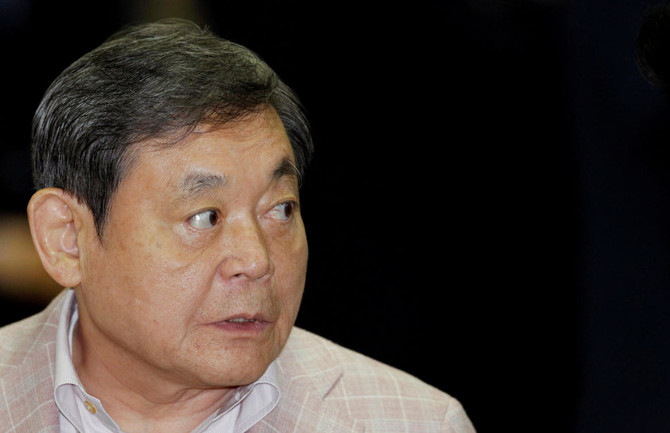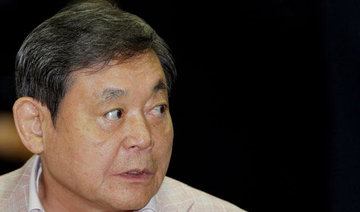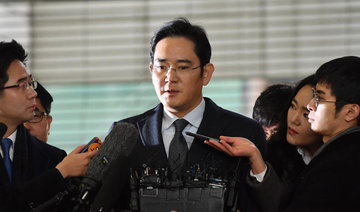SEOUL: Samsung Electronics’ ailing chairman, Lee Kun-hee, has been named by South Korean police as a suspect in an 8.2 billion won ($7.5 million) tax evasion case that involved the use of bank accounts held by employees.
A series of scandals has dogged the family of Samsung, the country’s biggest business empire.
The chairman’s son, Jay Y. Lee, heir to the Samsung Group, was released from detention earlier this week after an appeals court halved his sentence for bribery and corruption to two-and-half years and suspended it for four years.
Following a heart attack in 2014, the elder Lee, 76, has remained hospitalized in Seoul’s Samsung Medical Center and is difficult to commuicate with having shown little sign of recovery. Until his imprisonment Jay Y. Lee had been regarded as the de facto head of the group.
Police said the elder Lee could not be questioned due to his physical condition and Samsung declined comment.
“Samsung chairman Lee Kun-hee and a Samsung executive managed funds in 260 bank accounts under names of 72 executives, suspected of evading taxes worth 8.2 billion won,” the Korean National Police Agency said announcing plans to send the case to prosecutors.
Police added that the accounts, holding about 400 billion won, were found in the course of their probe into alleged improper payments for the renovation of Lee’s family residence.
The investigation into tax evasion harks back to the late payment of 130 billion won in tax in 2011, though only 8.2 billion of that sum falls within the statute of limitations, according to police.
The corruption case that led to the younger Lee’s arrest last year and brought down the former president Park Geun-hye prompted Samsung to vow to improve transparency in corporate governance and grant heads of the group’s affiliates more autonomy from the Lee family.
The group dismantled its corporate strategy office in late 2017.
The new liberal government led by President Moon Jae-in elected after the corruption scandal promised to put family-run conglomerates under stronger scrutiny and end the practice of pardoning corporate tycoons convicted of white-collar crimes.
Jay Y. Lee has not been seen back at the office since his release on Feb. 5, but members of the Korean business community expect him to take up the reins once again, and invest more in the business to create jobs that might help soothe public anger.
Returning home from prison, the younger Lee apologized for not showing his best side and said he would do what he could, but did not give specifics on his business plans.
While he spent a year behind bars, Samsung Electronics, the world’s top semiconductors maker, earned record profit as it benefited from a memory chip “super cycle.”
It is not the first time the elder Lee has been investigated for tax evasion. He was convicted in 2009 and later pardoned for the same offense after being embroiled in a scandal that also involved the use of accounts held by trusted employees.
Police say they have since identified more such accounts.
Shares in Samsung Electronics rose 1.1 percent compared with a 0.5 percent rise in the wider market. Blue chip tech stocks bounced after recent falls as investors saw current valuations as attractive, analysts said.
Samsung’s beleaguered chairman named as suspect in $7.5m tax evasion case
Samsung’s beleaguered chairman named as suspect in $7.5m tax evasion case

Hidden treasures: el Seed unveils “Continuum” in Diriyah

- As part of Art Week Riyadh, the French-Tunisian artist launches an interactive ‘passion project’
RIYADH: In conjunction with Art Week Riyadh, French-Tunisian artist Faouzi Khlifi — better known as eL Seed — has transformed the side streets of Diriyah into an interactive art experience.
His temporary installation “Continuum” uses his signature style, combining Arabic calligraphy and sculpture with vibrant colors and playful elements. This time, he’s inviting the public to embark on a scavenger hunt to uncover seven hidden artworks throughout the area. Visitors can access an online map to guide them to each installation.
“The concept of mixing sculpture and painting was something I wanted to for a few years. I did some experiments from 2019, but I never made it real. Until now,” he told Arab News.

“Continuum” is also deeply rooted in eL Seed’s ongoing exploration of identity.
“As a kid growing up in France to Tunisian parents, I felt so many times — people made me feel — that there was something missing, you know? That’s why I got into Arabic calligraphy, because of this identity crisis that had as a kid in France,” he says. “I needed to come back to my roots.”
Entirely self-funded and built with the help of a tight-knit local team, “Continuum” reflects eL Seed’s commitment to both community engagement and independent artistic expression.
“I’m an artist. This project for me was really about challenging myself,” he says. “I was not commissioned. It’s a passion project.

Over the past few months, he scouted various locations, ultimately selecting seven overlooked walls across Diriyah (because, he says, “six is too little and eight is too many”) — spaces that many pass by daily without noticing.
“I call those ‘lost walls.’ The wall has a story that people don’t even look at,” he says. “People just walk right by. They don’t even see it.”
Each of the sites features a unique Arabic quote chosen by the artist, sourced from Arab writers whose messages explore themes of belonging.
“The wall speaks to me and I know which quote to use for it,” el Seed says.

The sculptural works were produced in collaboration with Rashed AlShashai, a prominent Saudi artist who has a studio at JAX. They fabricated the custom items on site.
“I had a beautiful team of people who helped me to make it happen. The community helped me. The Rashed AlShashai team, they produced the sculpture in a week,” eL Seed says.
Planning for the project began back in September. Initially, eL Seed considered a different location — two hours from Riyadh — before deciding that Diriyah offered the perfect balance of visibility and charm.
And the project was, at one point, going to be launched in February, but he decided to launch it at the inaugural Art Week Riyadh instead, to give it “importance.”
The installations will be gone in two weeks. Though temporary, they are meant to spark long-lasting conversations around public space, memory and meaning.
“It’s a broken wall,” he says. “But for me, it’s about putting a sculpture where you’re not supposed to find it, and the conversation (it sparks) with people in the neighborhood… kids, other people… When I was working, a man was walking back home from the mosque. He’s like, ‘Why are you painting here? It’s like a museum now!’”
Alongside the public works, eL Seed is also debuting a new exhibition, which opened April 8, that ties into the themes of the outdoor installations.
Having been involved with the Kingdom for the past 15 years, eL Seed says he feels a deep connection to the country.
“I think people here appreciate my work and I appreciate the people here. I enjoy being here. I enjoy coming to Riyadh,” he says.
He hopes the public will hunt for the pieces, photograph them and engage with the city in a new way. Both on and offline.
“So it’s (art) and a treasure together,” he says. “And the cool part is: If you want to steal them, you can.”
Taliban publicly execute a third person for murder: Afghan Supreme Court

- Afghanistan’s Supreme Court said Taliban authorities executed three convicted murderers on Friday, bringing to nine the number of men publicly put to death since their return to power
KABUL: Afghanistan’s Supreme Court said Taliban authorities executed three convicted murderers on Friday, bringing to nine the number of men publicly put to death since their return to power, according to an AFP tally.
Two men were executed in front of spectators in Qala I Naw, the center of Badghis province, while a third was killed in Zaranj in Nimroz province, the Supreme Court said in a statement.
Israeli air strike kills 10, including 7 children

- Gaza’s civil defense agency: Israeli air strike that targeted the Al-Farra family home in central Khan Yunis
GAZA CITY: Gaza’s civil defense agency reported that a pre-dawn Israeli air strike on Friday killed 10 members of the same family, including seven children, in the southern city of Khan Younis.
“Ten people, including seven children, were brought to the hospital as martyrs following an Israeli air strike that targeted the Al-Farra family home in central Khan Younis,” agency spokesperson Mahmud Bassal said.
Court to rule on Danish arms sales to Israel case

- Danish media outlets Danwatch and Information revealed in 2023 that Israel’s F-35s were equipped with parts made by the Danish group Terma
COPENHAGEN: A Copenhagen court is to rule Friday whether a lawsuit filed by four humanitarian organizations accusing Denmark of violating international law by exporting weapons to Israel is admissible in court.
The Palestinian human rights association Al-Haq, Amnesty International, Oxfam and Action Aid Denmark filed the lawsuit against the Danish foreign ministry and national police last year.
They said in a statement there was a risk that “Danish military materiel was being used to commit serious crimes against civilians in Gaza.”
The associations targeted the foreign ministry in their lawsuit since it “determines whether there is a risk that weapons and weapons components could be used to violate human rights” and the police because it was the authority responsible for issuing export licenses.
Denmark’s Eastern High Court is expected to announce its decision around 10:00 am (0800 GMT).
“We are the biggest human rights organization in the world and our mandate is clearly to protect human rights,” the secretary general of the Danish branch of Amnesty International, Vibe Klarup, said in a statement.
Danish media outlets Danwatch and Information revealed in 2023 that Israel’s F-35s were equipped with parts made by the Danish group Terma.
“Amnesty International has been working for several years to rally support for the UN Arms Trade Treaty (ATT) to ensure that states’ arms trading is not used to commit human rights violations,” said Klarup.
Danish Defense Minister Troels Lund Poulsen argued in October that Denmark’s participation in the F-35 program was “crucial for our security and our relations with our main allies.”
Last year, Amnesty International accused Israel of “committing genocide” against Palestinians in Gaza.
The Danish lawsuit was filed in March 2024, on the heels of a similar suit filed in the Netherlands by a coalition of humanitarian organizations.
A Dutch court in December rejected demands by pro-Palestinian groups for a total ban on exporting goods that can be used for military means to Israel.
The health ministry in Hamas-run Gaza says the overall death toll has reached 50,846 since the war with Israel began on October 7, 2023, a figure the UN has deemed reliable.
Hamas’ unprecedented assault on Israel resulted in 1,218 deaths, mostly civilians, according to an AFP tally based on official Israeli data.
Nearly 100 killed after heavy rain in India, Nepal

- The Indian Meteorological Department raised a multi-hazard warning for the country on Wednesday
- Local media reported that more than 20 people have died in India’s most populous state of Uttar Pradesh
NEW DELHI: Nearly 100 people have died since Wednesday after heavy rain lashed parts of India and Nepal, officials and media said, and the weather department has predicted more unseasonal rain for the region.
The Indian Meteorological Department (IMD) had on Wednesday raised a multi-hazard warning for the country, with heatwave conditions in the western parts and thunderstorms in the eastern and central region.
In the eastern state of Bihar, at least 64 people died in rain-related incidents since Wednesday, a senior official from the state’s disaster management department told Reuters.
Local media reported that more than 20 people have died in India’s most populous state of Uttar Pradesh.
Meanwhile in neighboring Nepal, lightning strikes and heavy rain killed at least eight people, National Disaster Authority officials said.
India’s weather office expects heavy rain with thunderstorm, lightning and gusty winds over central and eastern India till Saturday.
The monsoon season usually begins in June in southern India, and summer months in the recent past have been marked by intense heatwaves that have killed several people.
State-run IMD said last week that India is expected to experience a much hotter April, with above normal temperatures across most of the country.



















